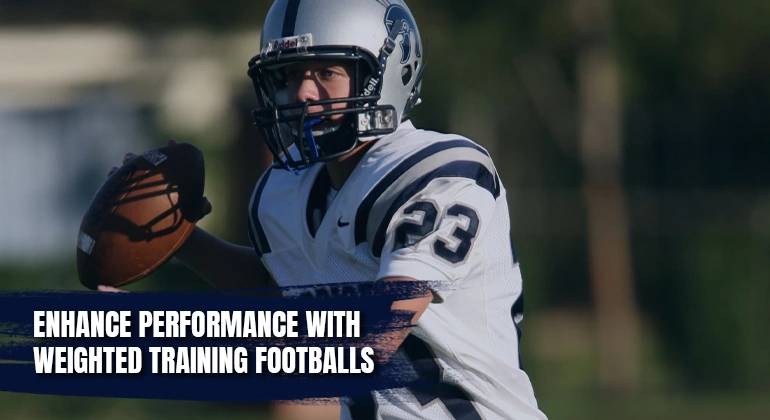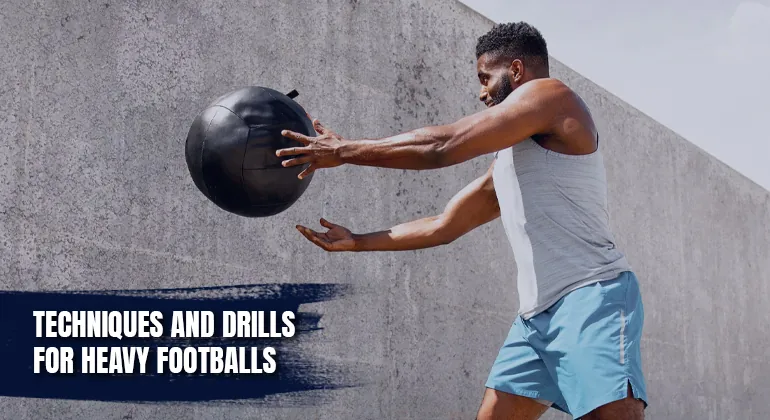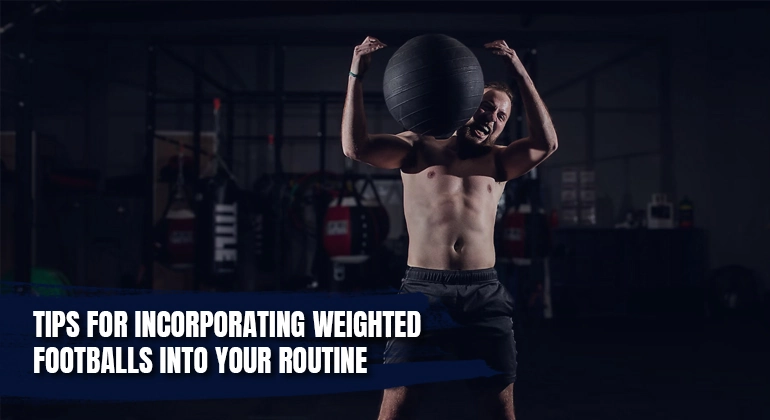
Football is a sport that requires a combination of skills, such as accuracy, power, and control. In order to enhance their performance, many football players turn to various forms of training. One such method that has been gaining popularity in recent years is the use of weighted training footballs. These footballs, which are heavier than standard footballs, can help players improve their technique and physical capabilities.
In this blog post, we will explore the benefits of using weighted training footballs and how they can help players enhance their performance on the pitch. We will discuss the science behind how these footballs work, and examine the best techniques and drills to incorporate into your training regimen. Additionally, we will address common misconceptions about weighted training footballs and answer frequently asked questions about their use.
If you're a football player looking to take your performance to the next level, or simply curious test and deca cycle about the benefits of weighted training footballs, this post is for you. So, grab your football and let's dive in!
Read about: Discover Khalil Mack Workout for Building Strength
The Science Behind Weighted Training Footballs
Weighted training footballs are designed to be heavier than standard footballs, typically weighing between 1-3 pounds. The added weight of these balls can significantly alter the way a player moves and interacts with the ball, leading to improvements in strength, power, and technique.
When a player uses a weighted training football, their body is forced to work harder to generate the same force as they would with a regular ball. This increased resistance can help to build strength in the muscles used for kicking, throwing, and other football skills. Additionally, the added weight can improve a player's balance and stability, as they must work to maintain control of the ball while performing movements that are more challenging than those required with a standard ball.
The use of weighted training footballs can also improve a player's technique by encouraging them to focus on the details of their movements. Because the added weight can make the ball more difficult to control, players must pay closer attention to their body positioning and movements in order to maintain control of the ball. This increased focus can help to develop muscle memory and refine techniques, leading to more precise movements on the pitch.
Benefits of Using Weighted Balls
Weighted balls are often used in athletic training to improve power, speed, and accuracy in sports such as baseball, softball, football, basketball, and more. Here are some of the benefits of using weighted balls:
- Increased Strength and Power: Weighted balls can help build strength and power by providing resistance during training exercises. This can translate to increased throwing speed, hitting power, and jumping ability.
- Improved Accuracy: By practicing with weighted balls, athletes can improve their muscle memory and coordination, leading to more precise movements and better accuracy.
- Injury Prevention: Using weighted balls can help prevent injuries by strengthening the muscles and tendons used in throwing and other sports-related movements. This can reduce the risk of strains, sprains, and other injuries.
- Variability in Training: Weighted balls come in a variety of sizes and weights, which can be used to create variability in training. This can help athletes develop a wider range of skills and adapt to different game situations.
- Increased Endurance: Using weighted balls can also help build endurance by challenging the muscles to work harder for longer periods of time.
It's important to note that weighted ball training should be used under the guidance of a qualified coach or trainer, as improper use can lead to injury.
Techniques and Drills for Heavy Footballs

Training with heavy footballs can provide a range of benefits for football players, such as nandrolone decanoate for bodybuilding improving arm strength, accuracy, and velocity. Here are some techniques and drills that can be used with heavy footballs:
- Long Toss: Long toss is a drill where two players stand a distance apart and throw the ball back and forth, gradually increasing the distance. Using a heavy football for long toss can help improve arm strength and throwing distance.
- Overload Throws: Overload throws involve using a heavier football than normal during practice. The extra weight can help build arm strength and improve throwing mechanics. Start with a weight that is comfortable and gradually increase the weight as strength improves.
- Resistance Band Throws: Resistance band throws are performed with a resistance band attached to a stationary object on one end and the player's wrist on the other. The player performs throwing motions with a heavy football while the resistance band provides additional resistance, helping to improve arm strength and throwing velocity.
- Wall Throws: Wall throws are performed by standing a few feet away from a wall and throwing the football at it with maximum force. Using a heavy football can help improve throwing power and accuracy.
- Dynamic Warm-Up: A dynamic warm-up with a heavy football can help activate the muscles and prepare them for throwing. This can include performing lunges, squats, and other exercises while holding the heavy football.
It's important to remember that heavy footballs should be used with caution and under the guidance of a qualified coach or trainer to prevent injury. Start with a weight that is comfortable and gradually increase the weight and intensity as strength and skill improve.
Common Misconceptions about Heavy Footballs
There are several misconceptions about heavy footballs that have been perpetuated over time. Here are some common misconceptions about heavy footballs:
- Heavy Footballs will automatically improve throwing accuracy and velocity: While training with heavy footballs can certainly help improve throwing accuracy and velocity, it's important to understand that it's not a magic solution that will automatically improve your skills. It takes consistent practice and proper technique to see results.
- Heavy Footballs are only beneficial for quarterbacks: While quarterbacks can certainly benefit from training with heavy footballs, players in other positions can also benefit from using them. For example, running backs can use heavy footballs to improve their grip strength, and wide receivers can use them to improve their catching ability.
- Heavy Footballs will lead to injuries: While it's true that using heavy footballs can increase the risk of injury if used improperly, this is true for any type of training equipment. When used correctly and under the guidance of a qualified coach or trainer, heavy footballs can be a safe and effective training tool.
- Heavy Footballs are only beneficial for advanced players: Players of all skill levels can benefit from training with heavy footballs. Whether you're a beginner or an experienced player, using heavy footballs can help improve your skills and take your game to the next level.
- Heavy Footballs are a replacement for proper technique: While heavy footballs can help build strength and improve throwing mechanics, they are not a replacement for proper technique. It's important to use proper throwing mechanics and form when using heavy footballs to ensure maximum benefit and minimize the risk of injury.
Tips for Incorporating Weighted Footballs into Your Routine

Incorporating weighted footballs into your routine can help you improve your arm strength, accuracy, and velocity. Here are some tips for incorporating weighted footballs into your training routine:
- Start with a Lighter Weight: If you're new to training with weighted footballs, start with a lighter weight than what you're used to. This will allow your body to adjust to the added resistance gradually, reducing the risk of injury.
- Warm-Up Properly: Before using weighted footballs, it's important to warm up properly to prevent injury. Do some dynamic stretches and exercises to get your blood flowing and prepare your muscles for the workout.
- Focus on Form: When using weighted footballs, it's essential to focus on your form and technique. Use the same throwing motion you use with a regular football and pay attention to your footwork, arm action, and follow-through.
- Mix it Up: Incorporate a variety of drills and exercises using weighted footballs to keep your workouts challenging and prevent boredom. For example, you can use heavy footballs for long toss, resistance band throws, and wall throws.
- Don't Overdo it: Training with weighted footballs can be demanding on your muscles and joints. Don't overdo it, especially when you're first starting. Gradually increase the weight and intensity over time to avoid injury.
- Work with a Trainer: Working with a qualified coach or trainer who has experience with weighted footballs can help you get the most out of your workouts while reducing the risk of injury.
Remember, the key to incorporating weighted footballs into your routine is to be consistent and patient. With regular practice, you can develop greater arm strength, accuracy, and velocity, helping you become a better football player.
FAQs on Weighted Balls
Here are some frequently asked primo steroid questions about weighted balls:
- What are weighted balls? Weighted balls are balls that are designed to be heavier than standard balls used in sports such as baseball, softball, and football. They are used for training purposes to improve strength, power, and accuracy.
- What sports use weighted balls? Weighted balls are commonly used in baseball, softball, football, basketball, and volleyball, among other sports.
- How do weighted balls work? Using weighted balls during training can help build strength, power, and accuracy by providing resistance during exercises.
- Can weighted balls be dangerous? Using weighted balls can be dangerous if used improperly. It's essential to use them under the guidance of a qualified coach or trainer to prevent injury.
- How heavy should weighted balls be? The weight of the ball depends on the sport and the individual athlete's strength and ability. It's essential to start with a weight that is comfortable and gradually increase the weight over time.
- Can weighted balls replace regular balls during practice? Weighted balls should not replace regular balls during practice. They should be used as a supplement to regular training to help improve strength, power, and accuracy.
- Who can benefit from using weighted balls? Athletes of all levels can benefit from using weighted balls, as they can help improve strength, power, and accuracy in various sports.
- What are some common drills used with weighted balls? Common drills used with weighted balls include long toss, overload throws, resistance band throws, wall throws, and dynamic warm-ups.
- How often should you train with weighted balls? Training with weighted balls should be done in moderation, with rest days in between. It's essential to listen to your body and not overdo it, as this can lead to injury.
- Where can I buy weighted balls? Weighted balls can be purchased online, at sporting goods stores, or through a qualified coach or trainer.
Conclusion
Incorporating weighted balls into your training routine can be an effective way to improve your strength, power, and accuracy in various sports. However, it's important to use them safely and under the guidance of a qualified coach or trainer to prevent injury. Starting with a lighter weight and gradually increasing the weight over time, focusing on proper form and technique, and mixing up your drills and exercises are all important factors to consider when training with weighted balls. By incorporating weighted balls into your routine and staying consistent, you can develop greater arm strength, accuracy, and velocity, helping you become a better athlete.